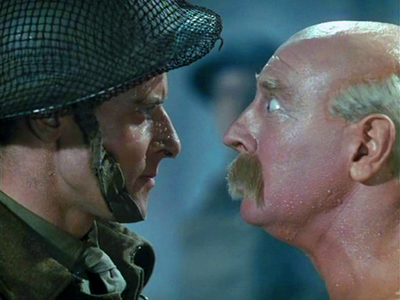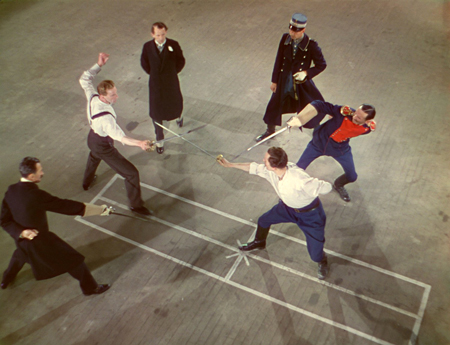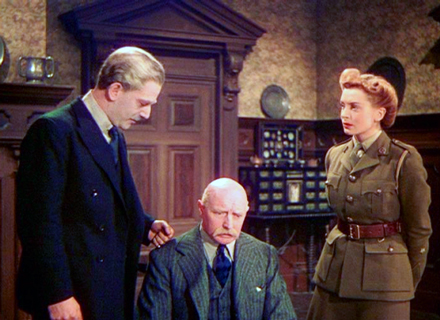
 |
|
|
|
A marvelous and original movie, The Life and Death of Colonel Blimp is a lavish Technicolor production made at the height of WW2, in an England suffering from dire shortages. A Michael Powell and Emeric Pressburger "The Archers" collaboration, it has an atypical theme for a wartime production. At a time when practically every film was packed with jingoistic messages, often demonizing the enemy, Powell and Pressburger chose to make what is perhaps the most civilized movie about war, peace, and national chauvinism ever. The story spans four decades and three major wars. In WW2, General Clive Wynn-Candy (Roger Livesey) is caught off guard in a Turkish bath when the 'enemy' in a home guard war game exercise decides to behave like real Nazis and take him prisoner hours before the game is supposed to begin. Flustered and humiliated, Candy tells the story of his career, starting in the Boer War. An honored soldier, he took it upon himself to go to Berlin to refute charges of British war crimes, fell in love with a governess abroad, Edith Hunter (Deborah Kerr), and fought a duel with a Prussian officer, Theo Kretschmar-Schuldorff (Anton Walbrook). Candy loses Edith to Theo, but is shocked to find her double, Barbara (Kerr again) back in England, 16 years later. WW1 is a trial of Wynn-Candy's ethics of fair play and chivalry. After the Armistice he approaches Theo, now a prisoner of war, and is dismayed to be rebuffed by him. But almost twenty years later, the two rivals cross paths once again. 
Colonel Blimp started as a popular satirical cartoon character, an overweight, walrus-mustached conservative military officer whose pomposity was used by artist David Low to skewer snobbish upper-class complacency and obsolescent ideas. Powell and Pressburger's 'Blimp', Clive Wynn-Candy, isn't satirical at all. The present-day part of the plot is a short episode where Candy does indeed realize that he has to change his values, but the majority of the picture is a flashback where it's shown that his values -- chivalry, fair play, loyal friendship -- run deep and true. We gain a full understanding of the character. By the end, he's not loveable because he's a fool, but because he's a good man, some of whose ideas are out of date. How The Life and Death of Colonel Blimp could have been filmed and released is a head-scratcher, and can only serve as testament to the creative power of the two wonder-men and their backer J. Arthur Rank. Some observations and speculations: It's in Technicolor. This grossly expensive and resources-consuming process stretched budgets in peacetime. But in war-torn London making a movie of this kind seems a gross extravagance. It's beautifully produced. Colonel Blimp is one of the loveliest-looking Technicolor films to date, and more artful than most Hollywood films. There are many large and elaborate sets designed by Alfred Junge, and scenes shot on a lavish scale. Hundreds of German officers are seen in a POW camp when there could have been just a few. It's 2 hours and 43 minutes long. The average feature at the time was half that length. It's not in line with the war effort. A British film with a German soldier as a sympathetic lead character was unheard of during the war. When England was fighting for its life, Germans were generally represented as ice-cold Nazi ideologues. The Theo Schuldorff character is just as civilized as Clive Candy, and he gets the girl, too. By showing an Englander and a German who had been enemies off and on twice in the past 40 years, Colonel Blimp insinuated that the two countries would be friends again soon -- not an attitude the War Office felt comfortable playing out on movie screens. Powell & Pressburger chose what they thought was a safe theme, that traditional English fair play was unsuitable when dealing with an enemy like Hitler. Here's where they must have thought they were stretching reality for the cause of patriotism, by asserting that Candy's English Army had always fought in a proud tradition of total ethical conduct. That war is ever waged on such civilized terms, by anybody, is a wretched myth that never dies. Instead, Colonel Blimp was probably despised because it suggested that England should fight 'dirty'. War propaganda offices need unity and clarity in their messages to the public; in its civilized way, Colonel Blimp sent mixed signals. The War Office probably felt Powell & Pressburger were courting counterproductive controversy. Laurence Olivier made an abstract cheering section movie out of his Henry V, extolling the conquering nobility of the British upper classes. Colonel Blimp suggests that a common-sense commoner, a soldier in the humble home guard, knows better how to wage war than do the professionals. Finally -- and this is what must really have ticked off Winston Churchill -- Colonel Blimp shows the BBC censoring General Candy's speech, following orders from higher up. The film assumes that the facts being given the wartime public are pruned and revised by the War Office. It doesn't matter that the filmmakers brand Candy's ideas as wrong, and dangerously obsolete. Any suggestion that there would be any dissent or confusion of ideas in the War effort must certainly have been seen as detrimental by the besieged government. The Life and Death of Colonel Blimp was probably granted a release because cooler heads realized that suppressing an expensive movie by their most prestigious filmmakers would show that free speech was indeed regulated, and hurt morale far more. A wise move indeed - I doubt that an American wartime film would have been granted such latitude. 
As it plays now, Colonel Blimp is a film England should be proud of. The young warrior (James McKechnie) who breaks the rules of a war game is no thug, as are the criminals in Robert Aldrich's The Dirty Dozen, a movie that actually covers the same issue, in the same country, in the same war. Instead, the healthy rebel is the new England, seen as efficient, up to date, and hip. He's even associated with Swing music. He's a home guardsman, a civilian soldier, and represents a country that the authors hope will soon drop its classed system. Clive Candy is bright, spirited, and given a deeply felt performance by Roger Livesey. He's also a softie in matters of love, an uncalculating kind of guy who discovers too late his heart's desire. When we meet him he's already a grandly medaled combat hero proudly wearing his decorations, and a fencing champion to boot. But everything we see of his career is sort of a muddle. American WW2 icons were hard-drinking, two-fisted patriots that love their mothers; English hero types tended to be ultra-efficient warriors that talk in clipped phrases and exercise total self-control. Clive Candy fumbles his way to Berlin and unintentionally creates an incident. His sham romance, invented so the embassy can save face, backfires when he falls in love just as his new German friend steals his girl. In WW1 we see him, as an acting Colonel, having a hard time just moving around his area of operations (compare that to John Wayne in In Harm's Way) and politely questioning some German prisoners, who obviously aren't going to cooperate. 1 Candy walks up to a friend, a defeated German officer surrounded by hundreds of fellow officers, and is shocked when his friend chooses to snub him and show solidarity with his countrymen. Roger Livesey's age makeup is astonishing, as the story takes him from a trim thirty to a corpulent seventy with complete credibility. There's some clever usage of body doubles in the Turkish bath, but that fat face is Livesey's, and it's tough to figure how it was done. It makes Orson Welles' work in Citizen Kane look like Halloween makeup. Again, Powell & Pressburger's sensibility can be felt in the film's sense of magic. Their later fantasies would take all sorts of cinematic liberties with reality, but the touches here are more like an acknowledgement of the 'magic in life', so to speak. The transition from 1942 back to 1902, with its echoing underwater voice, uses a real Turkish bath to effect a substitute 'wavy dissolve'. As in I Know Where I'm Going, a prophetic promise made by lovers comes true, and signals to Candy that it's time to change. 2 
And then there's the romantic notion of having the three female characters played by the same actress, Deborah Kerr in her first major role. Haunted by his lost opportunity in Berlin, Candy falls in love with her double back in England. He later chooses a driver out of 700 candidates for the same reason. It's quaint and charming, mainly because Kerr's characters are nicely drawn, even though the view of womanhood might depress female viewers. The vibrant Edith of 1902 bridles at the thought of settling down to be a wife and mother, but that's exactly what she does. Barbara we know less about, and mostly through Clive, but their marriage is at least affectionate -- the scene of them before the fire has a simple pleasant calm that sums up their relationship. 1942's Angela Cannon is a tough cookie and perhaps the best of the bunch. Unlike the retreating Edith she backs up her talk with action, by racing to try and warn her General. Between its German beer halls and its British Turkish baths, The Life and Death of Colonel Blimp takes in a remarkable breadth of content. It conveys a feeling of the past come alive in manners and attitudes from Edwardian times to the nights of the Blitz. To the propagandists of the Home office, the film was almost certainly an inconvenience, but in film history there isn't quite anything like it. It tells Britain's story from the viewpoint of 'Our Colonel Blimp', and instead of a laughingstock makes him an unofficial national hero. The Criterion Collection's Blu-ray of The Life and Death of Colonel Blimp takes this glorious movie to a new level, with brilliant color and a sharp image that show off a wealth of detail in image after image. Criterion's first DVD about 14 years ago was the first opportunity to see the full feature, as it had heavily edited (and was often shown in B&W) in the United States. This new release retains the original Michael Powell - Martin Scorsese commentary, and the old Carlton docu that spells out the remarkable nature of the film and its controversies, a perspective that a modern viewer needs. There's a generous section of original David Low Blimp cartoons, which come across as the Doonesbury of their day. A gallery of behind-the-scenes stills contains one rare image after another. Criterion producer Karen Stetler has been caretaking every Powell-Pressburger disc release from the inception of the format. New to this title is a 2012 video interview with Thelma Schoonmaker, Michael Powell's widow. A new essay by Molly Haskell graces an insert booklet packed with beautiful color images.
On a scale of Excellent, Good, Fair, and Poor,
The Life and Death of Colonel Blimp Blu-ray rates:
Footnotes:
1. Oddly, this scene refutes the film's main assertion that the Brits always choose fair play, as the South African Captain with the scarred face is clearly going to give the prisoners the works as soon as Candy leaves. When Candy claims that honor and fair play are essentials to the British Army, he's lying to himself -- an army with those kinds of official and unofficial rules would do what the Captain does -- wait until the stuffy command officer leaves the room.
2. In the light of I Know Where I'm Going, this magical prophecy sticks out as core Pressburger material, and gives the ending of Colonel Blimp a special emotional kick for Powell-Pressburger fans. The Archer's other wartime drama A Canterbury Tale another marvelous film in which magical events are imposed on a 'normal' wartime reality. This English-Hungarian collaboration expressed facets of the English character not seen elsewhere. 3.The helpful Steve Crook informs me that One of Our Aircraft is Missing is the first official Archers film. Crook is associated with the informative Powell & Pressburger Email Group.
Reviews on the Savant main site have additional credits information and are often updated and annotated with footnotes, reader input and graphics.
Review Staff | About DVD Talk | Newsletter Subscribe | Join DVD Talk Forum |
| ||||||||||||||||||